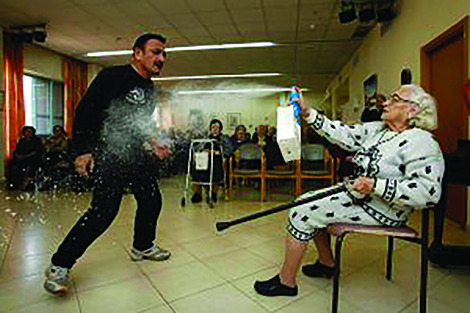Seniors may be statistically less likely to be the victim of a violent crime than younger age groups, but the fallout of a violent crime against a senior can be much more devastating.
Reaction times are reduced as we age, and seniors may not have optimal health, so a physical attack can take longer to recover from, cause more injuries and be more life-threatening. Conditions like diminished vision and hearing or dementia can also make seniors more vulnerable to crime. A few ways seniors, their friends, families and caregivers can enhance personal safety include:
Fortify residences.
Seniors who are living independently in a single-family home should make sure that bushes and trees are trimmed back from the home. This will help eliminate hiding places for criminals. Bright landscape lighting can also help to deter burglars and motion-sensing lighting should be installed in dark corners of the yard or near access points.
Never allow anyone unexpected into your home, even if they have a work uniform. Check ID and if unsure, call the company, especially if you didn’t schedule any service.
Enhance security.
Security systems and personal emergency-response devices can help seniors reach help if a break-in occurs or if there is a medical emergency. Some devices have features that will also notify family or caregivers if something is wrong, so if for some reason a call is not responded to by the alarm company, loved ones or caregivers can follow up to ensure everything is okay.
Enroll in a self-defense class.
Seniors can benefit from self-defense classes that help to educate about scams or how to use body language and confident verbal communication to scare off a potential attacker. Classes can also help teach about mitigating risk factors and how to be more aware of surroundings.
Better safe than sorry.
If you return home and things don’t look right, don’t just chalk it up to forgetfulness that you left items out or out of place. Go to a neighbor’s house or get back in your car and call a family member or the police to come check the house with you. There is no reason to stumble upon a burglar alone. And, if there have been break-ins in your area, take extra precautions. Purchase something simple like a whistle or an air horn that you can sound if someone breaks in while you are home and you need help.
Invest in easy-to-use protection.
Don’t be afraid to protect yourself if threatened. The Defense Alert Device (D.A.D. 2) is an easy tool for seniors to wear on their hand when walking, running errands or checking who is at the front door. It combines a flashlight, emergency-alert system and a non-lethal, military-grade defense spray. A simple press of a button will send an SOS alert — to friends, family, good samaritans within one mile of your location, and the police who have the app — that you are being attacked.
Pepper spray and all other non-lethal devices typically have a 50 percent to 70 percent stop rate. Over 15 years, the technology in the D.A.D. 2 has tested to over 96 percent stop rates due to superior spray, partial size, pattern, velocity and most importantly, its stealth method of disbursement that does not allow the attacker to take defensive measures, especially that of holding his breath. Therefore, the respiratory impact is far more incapacitating.
